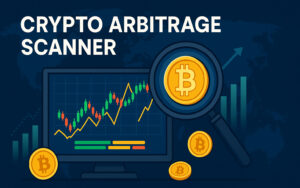Introduction
Crypto arbitrage scanner is a software program that cryptocurrency traders use to find and take advantage of price differences between various exchanges of cryptocurrencies. Arbitrage refers to a situation where an individual purchases a commodity for a lower price on a first exchange but sells for a higher price on a second. Crypto arbitrage scanners automate the process by quickly scanning a list of exchanges, discovering profitable opportunities, and notifying the user immediately.

Illustration of a monitor showing crypto price charts, Bitcoin coins, and a magnifying glass.
What Is a Crypto Arbitrage Scanner?
The crypto arbitrage scanner is a computer program that automatically monitors cryptocurrency prices on different platforms of trading. Its fundamental function is spotting price discrepancies for the same digital currency on different exchanges. Traders find these scanners appealing because cryptocurrencies are frequently traded at a different price on different markets due to forces such as liquidity, level of transactions, and market imperfections.
Scanner technology primarily involves APIs (Application Programming Interfaces) that connect the scanner to a variety of crypto exchanges. These APIs are automatically updated with current data, so the scanner can compare prices instantly. As soon as a profitable opportunity becomes available, the scanner notifies the trader through alerts or notifications. These are indispensable for speed and accuracy because price gaps vanish quickly.
Crypto arbitrage scanners are diverse with respect to level of sophistication and feature set. Basic arbitrage scanners merely seek the detection of price imbalances. Advanced arbitrage scanners can be equipped with automated trading robots, backtests of past data, risk management, and user-selectable alerting.
History of Crypto Arbitrage Scanners
Crypto arbitrage scanners emerged not long after cryptocurrencies were publicly traded. In early Bitcoin days, from around 2011–2013, arbitrage was widespread due to the decentralized nature of the crypto exchanges. Traders tediously kept track of price disparity by hand, but this was tedious, and many of these chances slipped through the cracks.
First automated arbitrage scanners of cryptos were simple programs put together by tech-savvy traders. As the market for cryptocurrencies became more prominent, there was a demand for better tools. Commercial arbitrage scanners came into existence by 2016, which offered user-friendly interfaces, real-time alerts, and integrated trading robots.
Today, arbitrage scanners are computer programs that are capable of handling complicated strategies. Their development reflects the growing sophistication of the cryptocurrency markets, where speed, efficiency, precision are the keys to a successful trade.
Technology Behind Crypto Arbitrage Scanners
Crypto arbitrage scanners are almost completely reliant on APIs of crypto exchanges. These APIs provide current data of prices, trading volume, and order book depth. Scanner software processes this information quickly, comparing prices of a few platforms simultaneously.
The most important part of a scanner for arbitrage is a good algorithm. Such an algorithm, being able to rapidly analyze enormous quantities of information, reveals large price spreads. Effective algorithms are able to process information from several dozens of exchanges almost instantly, which helps a trader to instantly exploit revealed arbitrage chances.
High-end arbitrage scanners use cloud computing for enhanced performance. Cloud arbitrage scanners can offer quicker data processing and service continuity that are critical for arbitrageurs that aim to capitalize on temporary price differentials.
Platforms and Popular Crypto Arbitrage Scanners
Crypto arbitrage scanners are found on many platforms, such as web-based platforms, desktop programs, and smartphone apps. Traders can choose from scanners that match their preferred modes of trading and level of accessibility.
Best cryptocurrency arbitrage scanners are CryptoHopper, Bitsgap, and Blackbird. CryptoHopper offers automated trading robots with inbuilt arbitrage features, while Bitsgap offers powerful arbitrage monitoring tools with a feature of portfolio management. Blackbird is a Bitcoin arbitrage-specific open-source scanner that is fast and reliable.
All platforms share unique strengths, from the simplicity and user-friendliness to customization and automation features. Choosing the right scanner often depends on the needs of the trader, trading frequency, level of technical knowledge, and budget.
How to Use a Crypto Arbitrage Scanner
The process of operating a crypto arbitrage scanner is normally a few simple steps. Traders, initially, select and subscribe to a scanner service. Subsequently, traders connect exchange accounts to the scanner through the use of API keys for secure communication between exchanges.
Once a user installs the program, they merely install their alert settings and trading parameters. These can be setting minimum profit targets, preferred exchanges, and asset types. When entered, the scanner operates indefinitely, continually seeking profitable opportunities, and informing when a favorable trade presents itself.
There are a few high-tech scanners that provide completely automated trading. These ones execute the trades automatically through pre-configured settings, so that the trader can earn money without active involvement.
Pros and Cons of Crypto Arbitrage Scanners
The primary benefit of using crypto arbitrage scanners is through greater trading efficiency. They significantly reduce the time and effort expended to discover profitable trades via manual means. In addition, they can analyze data significantly faster and more accurately than a person, thus increasing the likelihood of successfully unearthing arbitrage opportunities.
Another advantage is having the opportunity of frequent, low-risk earnings. Arbitrage trading inherently includes insignificant market risk, because the identical asset is being simultaneously purchased and sold. These risks involved are mainly the execution delay, commission, and exchange-related risks.
While effective, the crypto arbitrage scanners are not without a downside. Profitable arbitrage situations frequently disappear with more efficient marketplaces. Technicalities such as failure of the API or lag from the network can equally reduce efficiency.
Future of Crypto Arbitrage Scanners
The prospects for arbitrage crypto scanners are promising, fueled by ongoing advancement of blockchain, artificial intelligence, and machine learning. As market situations continue to fluctuate, speedier, smarter scanners will be better positioned to take advantage of changing trading scenarios.
Possible new decentralized exchanges (DEXs) may provide new arbitrage chances. Scanners will be required to be able to perfectly interface with these exchanges to be of value. In addition, increasing regulator interest in crypto exchanges might affect arbitrage scanner operations, entailing compliance with more stringent norms, including transparency.
Conclusion
Crypto arbitrage scanners are just as essential for all cryptocurrency traders seeking effective, low-risk profits. Evolution of such arbitrage scanners from simply scripts to sophisticated automated trading platforms is a testimony to their importance for today’s crypto market participants. Although traders need to be cautious of risks and technology limitations, technology evolution implies that these arbitrage scanners will remain central to arbitrage trading of cryptocurrencies.














 Twitter
Twitter
 Telegram
Telegram
